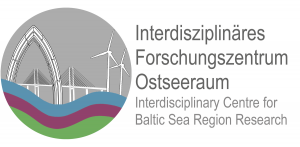The Baltic Sea region stands out as one of the most integrated maritime cultural areas globally. However, since 1989, political and social upheavals have posed challenges to the region, prompting states and societies to respond with both ‘integration’ and ‘demarcation.’ In light of these dynamics, the research projects of the Interdisciplinary Research Center Baltic Sea Region (IFZO) at the University of Greifswald delve into the fragmented transformation in the Baltic Sea region. IFZO focuses on addressing key social, (security) political, and economic questions in the context of current developments.
IKEM is a partner of IFZO. Under the leadership of Prof. Dr Michael Rodi, who is also the Director of IKEM, the IFZO research department Climate and Energy Policy is developing strategies and concepts for overcoming the fragmented energy policy in the Baltic Sea region in order to make it a model region in the field of energy transformation. Dr Michael Kalis, who is both a Research Associate at IFZO and Head of the Research Academy at IKEM, also has a dual role. In the following interview, he discusses the goals of IFZO, his research focus, and the opportunities for the energy transition in the Baltic Sea region.
With IFZO, the University of Greifswald receives funding for Baltic Sea research for a duration of five years. How did this come about?
Due to its location alone, the University of Greifswald has a close connection with the Baltic Sea region and, accordingly, a long tradition in Baltic Sea research. This focus offers students and researchers a comprehensive insight into a region that is characterized by diverse cultural, historical, natural, social and societal conditions. As an affiliated institute of the university, this orientation has always been part of the IKEM DNA and forms the basis for collaborative projects such as Baltic InteGrid, MAMBA, MobiRural, CAMPFIRE or BOWE2H.
What is meant by the research topics of transformation and fragmentation?
The IFZO is dedicated to processes that will have a decisive impact on the future of the Baltic Sea region: On the one hand, the processes of transformation by humans – unintentionally, for example in the case of environmental changes and climate change, as well as intentional, for example in the construction of wind farms or other new infrastructures. On the other hand, we are also seeing increasing fragmentation in the energy transition, for example: different energy mixes and technologies illustrate that changes in the energy landscape are not uniform and linear, but diverse and occur at different speeds.
What findings does the research center provide?
IFZO aims to develop governance approaches to overcome fragmentation and general obstacles to sustainable transformation. To achieve this, the center seeks to gain insights into perceptions and discourses, as well as legal, political, and social science aspects.
IKEM primarily focuses on energy and climate protection issues at IFZO. What challenges does the Baltic Sea region face?
Scientific assessments suggest that the Baltic Sea region could be the first European region to achieve climate neutrality. This is also due to the enormous potential for renewable energy generation in the region. However, this potential is not always fully utilised due to societal counter-movements and national unilateral actions. While countries like Denmark and Sweden are considered pioneers in many aspects of the energy transition, the region also exhibits ties to fossil fuels and perceived bridging technologies such as nuclear energy.
What is your research focus at IFZO?
I am investigating issues related to energy transition law in the Baltic Sea region. My primary focus lies on the legal framework for hydrogen and negative emission technologies, including questions regarding hydrogen import and trade within the EU. Additionally, I am exploring the Energy Trilemma, which involves balancing energy security, energy justice, and sustainability. Overall, my research aims to generate legal insights into these complex areas and contribute to sustainable development in the Baltic Sea region.
Can you share any findings with us?
The importance of energy security has increased significantly, particularly in the wake of the energy crisis and Russia’s invasion of Ukraine. In coping with these challenges, there is evident fragmentation in the approaches to the energy transition. Varied roles, especially concerning production and consumption, as well as differing perspectives on market uptake, also highlight fragmentation in the context of hydrogen.
Both developments underscore the need for Baltic Sea states to collaborate more closely in addressing common challenges such as the energy crisis and energy transition. Simultaneously, the diverse starting points and individual contexts of each country must be taken into account. Approaches for such collaboration in the Baltic Sea region exist, for example, through shared infrastructures like the Baltic Corridor and the European Hydrogen Backbone. This type of cooperation could be the key to a successful energy transition in the Baltic Sea region.
How can these and other insights contribute to the long-term sustainable development of Mecklenburg-Vorpommern?
Although Mecklenburg-Vorpommern is not the central focus of IFZO’s research, the institute’s findings are crucial for the region. This is particularly evident in the context of offshore wind energy in the Baltic Sea region and the challenges surrounding NordStream 1 and NordStream 2.
The coast of Mecklenburg-Vorpommern will continue to play a pivotal role in the energy transition in the Baltic Sea region, serving as a landing point for existing gas pipelines and planned hydrogen pipelines, such as the one from Bornholm to Lubmin.
Furthermore, Mecklenburg-Vorpommern greatly benefits from IFZO’s research on peatlands and paludiculture, which are significant CO2 sinks, contributing to increased sustainability and climate protection.





